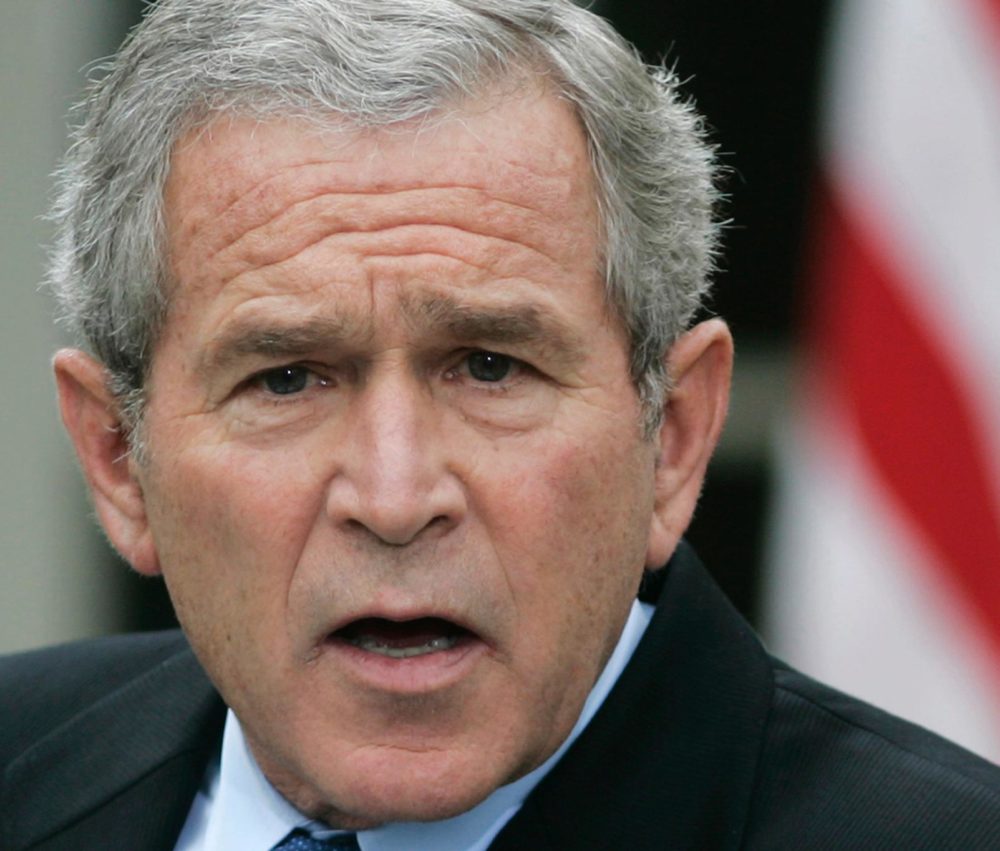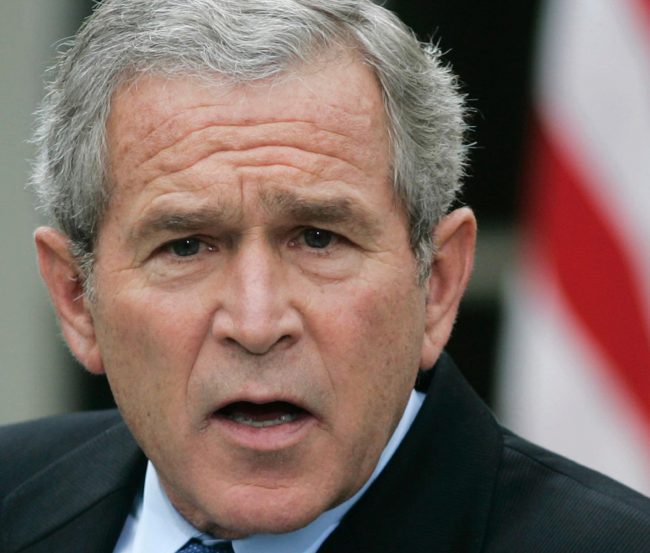
President George W. Bush speaks during a news conference in the Rose Garden of the White House in 2006. (Courtesy of AP)
The George W. Bush Presidential Library and Museum will ask visitors: if you were in President Bush’s shoes, what would you do?
In an exclusive interview with The Daily Campus, President George W. Bush discussed how his vision for the library and his legacy work hand in hand.
The museum’s Decision Points Theater will give visitors the opportunity to relive Bush’s decisions in the White House.
Visitors will listen to advisers before voting on what they would do on issues that have defined George W. Bush’s presidency: the invasion of Iraq, the surge of troops in 2007, the federal response to Hurricane Katrina and the financial crisis.
Bush hopes that the experience offers perspective to visitors.
“One of the central aspects of life is that you’re going to have to deal with something that you didn’t want to deal with,” he said. “The challenge is how do you deal with it.”
When he ran in 2000, Bush described himself as a “compassionate conservative.” He wanted to be remembered as the president who reformed education and the tax system. But, after Sept. 11, the Bush administration was forced to focus on terrorism and national defense.
“There’s nothing more important for a president than to protect the country from attack, and we were attacked,” he said.
The ramifications of his decisions – from the opening of Guantanamo to the bailout of Wall Street’s largest banks – left Bush with historically low approval ratings.
Bush left office with an approval rating 33 percent positive and 66 percent negative.
“I hope people [walk away] with an objective analysis of the decisions I made,” Bush said. “The problem I have with short-term history is that it’s impossible for anybody to write an objective history until there’s been time.”
A tour through the museum will highlight the watershed moment in Bush’s presidency: September 11th.
The museum will feature a piece of “impact steel” – steel struck directly by one of the hijacked jets – from the Twin Towers.
“The 9/11 exhibit is going to be a very profound experience. But a very necessary exhibit,” Bush said.
He hopes that the exhibit serves as a reminder to younger generations.
“We have kids here who don’t have any clue what 9/11 means. It’s going to be a powerful reminder of some truths,” Bush said. “[9/11] is slowly but surely just becoming a date on the calendar.”
The museum will also highlight oft-neglected parts of the Bush presidency like the president’s efforts to fight AIDS in Africa and his role in creating one of the world’s largest marine preserves.
“It’s the single-largest act of ocean conservation in history. It’s a large milestone,” Conrad Lautenbacher, head of the National Oceanic and Atmospheric Administration, said to NBC when the preserve opened in 2006.
The museum will challenge many assumptions about the Bush presidency – from its triumphs to its failures.
Bush hopes that historical discussion about his presidency continues long after his death.
“I called my staff one time in Washington and I had just finished a great book on George Washington, and I said, ‘I just want y’all to know that they’re still analyzing Washington.’ History has a long reach to it,” he said.
But, Bush’s vision for the library is more than just about examining the past.
“[I want] to establish an institute that is results oriented and that endures way beyond my time,” Bush said.
The center’s policy-driven institute will focus on issues that Bush emphasized during his presidency: education reform, human freedom, global health, military service, economic growth and women’s initiatives.
The women’s initiative fellowship program, designed to help Middle Eastern women develop their leadership skills, welcomed its second group of fellows in March.
SMU’s role in the women’s initiative was a vital one – an SMU professor originally noted that Middle Eastern women needed technical training and networking help to make a larger impact in their communities.
“It gives us credibility to be associated with a fine university. There are a lot of synergies to be achieved between different programs,” Bush said.
Beyond its global work – helping to fight cervical cancer in Africa and supporting democracy activists in authoritarian regimes – the center has also focused on the Dallas community.
In partnership with the St. Mark’s School of Texas, the Dallas Urban Alliance, the SMU debate team and other partners, the Bush Institute hosted a high school debate tournament.
Students debated on the topic of economic growth and property rights and learned about America’s economic future.
As with many other institute programs, the debate reflected Bush’s role as an education advocate.
“When I got elected president, I campaigned hard on closing the achievement gap amongst all students by insisting upon measuring to determine whether or not objectives and goals were being met,” he said.
For Bush, the bar must be set high for all students no matter racial or socioeconomic background.
“This nation should challenge the soft bigotry of low expectations,” he said.
After leaving the White House, Bush has placed high expectations on himself.
“It’s one of the challenges of the post-presidency – you’ve had the pinnacle of fame and power,” he said. “How do I make sure that I continue to challenge myself in a way that enables me to help humanity?”
Bush believes that the best way for him to continue to impact society is for the library and institute to do policy-oriented work.
“I know people will leave impressed. But, where I want people to be really impressed is what we do here,” he said.
“I keep reminding people that in order to succeed this can’t be about me. It’s got to be about the universality of freedom or the importance of free enterprise or the importance of good education for a free society.”
Bush hopes that the institute’s different contributions to education, health, democracy and the economy have a lasting impact on freedom and liberty for peoples across the world.
“My hope is that thirty years from now the institute endures and is a contributor to peace and freedom.”
Time is already making a difference for Bush’s legacy. An April Washington Post-ABC News poll revealed that Bush’s approval rating is 47 percent positive – already 14 points higher than when Bush left office in 2009.









